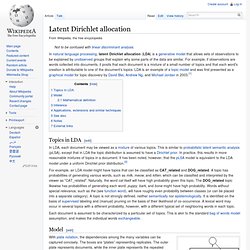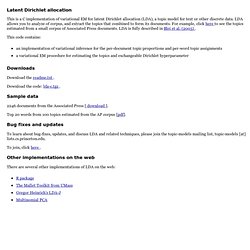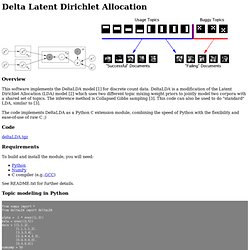

Latent Dirichlet allocation. In natural language processing, latent Dirichlet allocation (LDA) is a generative model that allows sets of observations to be explained by unobserved groups that explain why some parts of the data are similar.

For example, if observations are words collected into documents, it posits that each document is a mixture of a small number of topics and that each word's creation is attributable to one of the document's topics. LDA is an example of a topic model and was first presented as a graphical model for topic discovery by David Blei, Andrew Ng, and Michael Jordan in 2003.[1] Topics in LDA[edit] In LDA, each document may be viewed as a mixture of various topics. This is similar to probabilistic latent semantic analysis (pLSA), except that in LDA the topic distribution is assumed to have a Dirichlet prior. For example, an LDA model might have topics that can be classified as CAT_related and DOG_related. Each document is assumed to be characterized by a particular set of topics. Latent Dirichlet Allocation. Latent Dirichlet Allocation in C. This is a C implementation of variational EM for latent Dirichlet allocation (LDA), a topic model for text or other discrete data.

LDA allows you to analyze of corpus, and extract the topics that combined to form its documents. For example, click here to see the topics estimated from a small corpus of Associated Press documents. LDA is fully described in Blei et al. (2003) . This code contains: an implementation of variational inference for the per-document topic proportions and per-word topic assignments a variational EM procedure for estimating the topics and exchangeable Dirichlet hyperparameter Downloads Download the readme.txt .
Download the code: lda-c.tgz . Sample data 2246 documents from the Associated Press [ download ]. Top 20 words from 100 topics estimated from the AP corpus [pdf]. Bug fixes and updates To learn about bug-fixes, updates, and discuss LDA and related techniques, please join the topic-models mailing list, topic-models [at] lists.cs.princeton.edu. Lda, a Latent Dirichlet Allocation package. Daichi Mochihashi NTT Communication Science Laboratories $Id: index.html,v 1.3 2004/12/04 12:47:35 daiti-m Exp $ Overview lda is a Latent Dirichlet Allocation (Blei et al., 2001) package written both in MATLAB and C (command line interface).
This package provides only a standard variational Bayes estimation that was first proposed, but has a simple textual data format that is almost the same as SVMlight or TinySVM. This package can be used as an aid to understand LDA, or simply as a regularized alternative to PLSI, which has a severe overfitting problem due to its maximum likelihood structure. For advanced users who wish to benefit from the latest result, consider using npbayes or MPCA: though, they have data formats different from above. Requirements C version: ANSI C compiler. MATLAB version: A MATLAB environment. Install C version Take a glance at Makefile; and type make. MATLAB version simply add a directory where you have unpacked *.m into MATLAB path. Download Performance. LDA-J. DeltaLDA Code. Overview This software implements the DeltaLDA model [1] for discrete count data.

DeltaLDA is a modification of the Latent Dirichlet Allocation (LDA) model [2] which uses two different topic mixing weight priors to jointly model two corpora with a shared set of topics. The inference method is Collapsed Gibbs sampling [3]. This code can also be used to do "standard" LDA, similar to [3]. The code implements DeltaLDA as a Python C extension module, combining the speed of Python with the flexibility and ease-of-use of raw C ;) Code deltaLDA.tgz Requirements To build and install the module, you will need: See README.txt for further details.
Topic modeling in Python from numpy import * from deltaLDA import deltaLDA alpha = .1 * ones((1,3)) beta = ones((3,5)) docs = [[1,1,2], [1,1,1,1,2], [3,3,3,4], [3,3,4,4,3,3], [0,0,0,0,0], [0,0,0,0]] numsamp = 50 randseed = 1 (phi,theta,sample) = deltaLDA(docs,alpha,beta,numsamp,randseed) Questions/Comments/Bugs Open up your Python interpreter and e-mail me at: